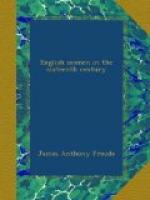So matters stood for what remained of Henry’s reign. As far as he had gone, he had quarrelled with the Pope, and had brought the Church under the law. So far the country generally had gone with him, and there had been no violent changes in the administration of religion. When Henry died the Protector abolished the old creed, and created a new and perilous cleavage between Protestant and Catholic, and, while England needed the protection of a navy more than ever, allowed the fine fleet which Henry had left to fall into decay. The spirit of enterprise grew with the Reformation. Merchant companies opened trade with Russia and the Levant; adventurous sea captains went to Guinea for gold. Sir Hugh Willoughby followed the phantom of the North-west Passage, turning eastward round the North Cape to look for it, and perished in the ice. English commerce was beginning to grow in spite of the Protector’s experiments; but a new and infinitely dangerous element had been introduced by the change of religion into the relations of English sailors with the Catholic Powers, and especially with Spain. In their zeal to keep out heresy, the Spanish Government placed their harbours under the control of the Holy Office. Any vessel in which an heretical book was found was confiscated, and her crew carried to the Inquisition prisons. It had begun in Henry’s time. The Inquisitors attempted to treat schism as heresy and arrest Englishmen in their ports. But Henry spoke up stoutly to Charles V., and the Holy Office had been made to hold its hand. All was altered now. It was not necessary that a poor sailor should have been found teaching heresy. It was enough if he had an English Bible and Prayer Book with him in his kit; and stories would come into Dartmouth or Plymouth how some lad that everybody knew—Bill or Jack or Tom, who had wife or father or mother among them, perhaps—had been seized hold of for no other crime, been flung into a dungeon, tortured, starved, set to work in the galleys, or burned in a fool’s coat, as they called it, at an auto da fe at Seville.
The object of the Inquisition was partly political: it was meant to embarrass trade and make the people impatient of changes which produced so much inconvenience. The effect was exactly the opposite. Such accounts when brought home created fury. There grew up in the seagoing population an enthusiasm of hatred for that holy institution, and a passionate desire for revenge.




